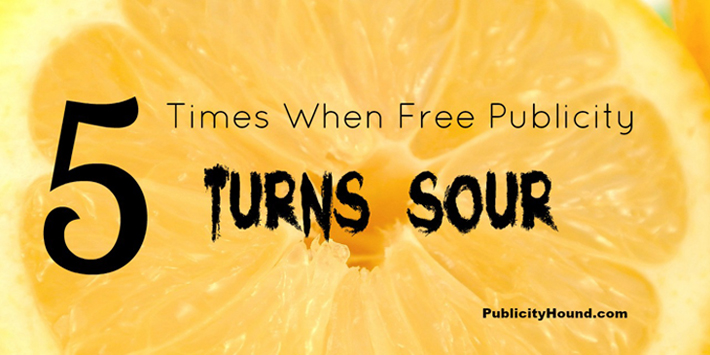
That’s what I told a reader last week when he asked me if free publicity has any disadvantages. It sure does. Here are five instances free publicity, otherwise sweet, can turn sour.
1. Your book isn’t ready, but a top-tier media outlet calls.
You’re still writing your book. But an assistant producer for a major show on National Public Radio calls. She got a whiff of your book title and she thinks the topic sounds fascinating. She wants to know if you’re available for an interview next week.
If you’re going after publicity to sell books, politely decline and ask if you can touch base with her again in a few months after your book is out. If she wants you bad enough, she’ll say yes. If she says no, you can always try pitching later.
Publicity can grow like a snowball rolling downhill. The danger in saying yes to one big interview is that other bloggers, podcasters and other journalists might hear you on NPR and call you so they can cover your story too. By the time you’re done with several top-tier interviews, you’ve blown your chances for a second appearance.
2. “Good Morning, America” wants you to comment on a topic you discarded long ago.
That’s what happened to author Judith Briles earlier this year when GMA called and wanted her to fly to New York to comment on a book she published many years ago on how women back stab each other in the workplace.
She declined because being associated with that topic wouldn’t do her any good today in her career as a book shepherd who works with authors to publish their books.
“When you’re seeking publicity, is it to support your book and your passion and to ease someone’s pain?” she asks. “Or is it to stroke your ego? If it’s to stroke your ego, take all the publicity you can get.”
But don’t expect to sell books as a result, she adds.
“You can offer an exclusive to them when the book comes out because if you jump the gun and the book isn’t out for another month, you won’t be going back onto that show.”
3. You don’t have a website.
Publicity done well can result in requests for speaking engagements, phone calls from potential consulting clients, and sales of your products and services.
When viewers see someone talking about you on Facebook or Twitter, or they hear you on a radio show, they might start searching for your website. If they don’t fine one, those potential leads can disappear in an instant.
Don’t go after publicity unless you have a website or a blog that’s your home base and a place where people can connect with you. Even if your products are selling well on Amazon without a website, people hunting for you might not think to look there.
Ideally, you’ll also have a subscription box where people can sign up for your email list. Grab my cheat sheet “10 Profitable Ways to Use Email to Create SuperFans Who Help You Sell Books.”
A website doesn’t have to be fancy. Just a few pages are fine. Here’s an excellent template for a book sales page. If you’re selling a book and this is all you have, you’ll be much farther ahead than most authors.
4. You aren’t ready for prime time and feel uncomfortable in the spotlight.
If you’re serious about publicity, pay for media training. You need to know how to develop your key message, craft sound bites, and keep your head above water by using bridging statements if a nasty interviewer starts pulling you under.
If you’re adamant about not appearing on TV for whatever reason, stick with radio.
But learn how to be a good guest and adapt to the timing and pace of radio interviews. They’re far different from interviewing for print because answers have to be much shorter.
5. You don’t have a system in place to deal with more orders than you can handle.
If a joint venture partner with a huge audience wants to promote you, but you don’t have enough product in stock, hold off until you have adequate inventory to fill many orders. Will you need to bring extra people on board? Or hire an assistant temporarily?
Blog tours, a series of back-to-back radio or TV interviews, and a social media promotion that goes viral can surprise you when you least expect it.
A well-coordinated publicity campaign isn’t enough. You must have all the other elements mentioned above.
Those are my ideas. What have I missed? When else can publicity turn sour?